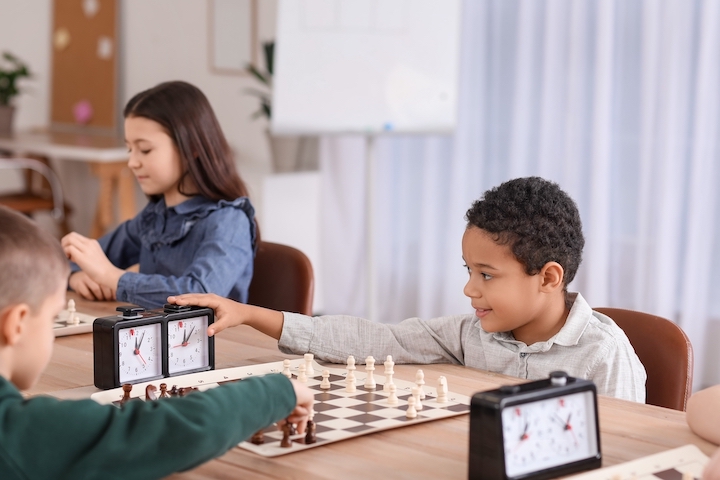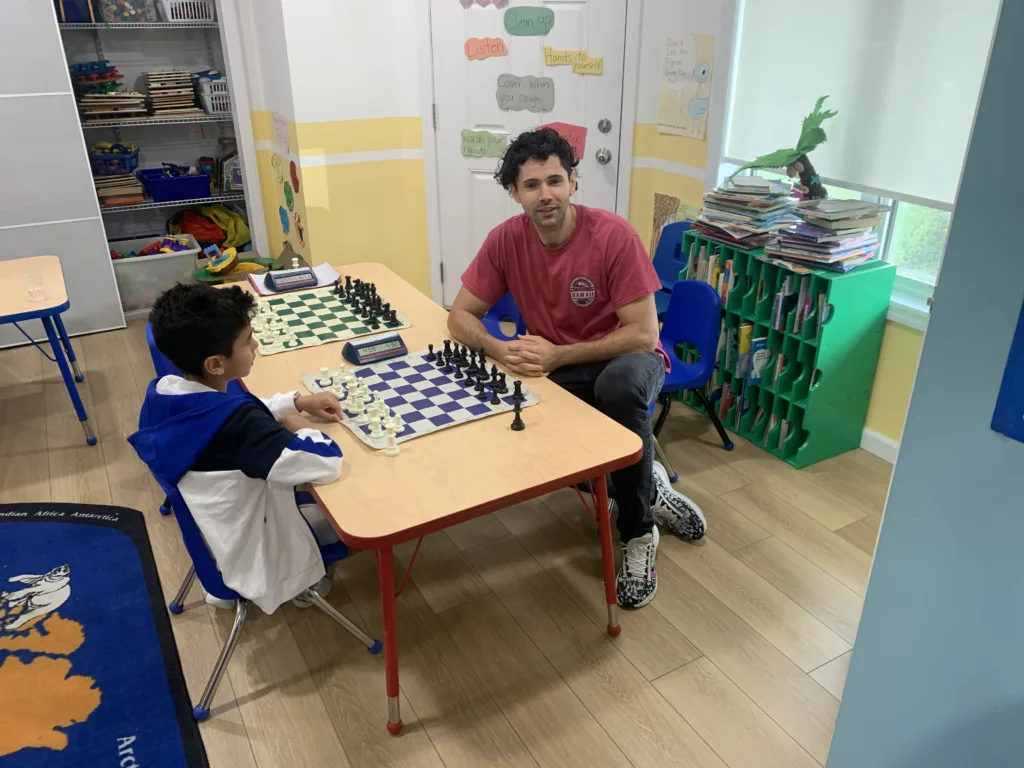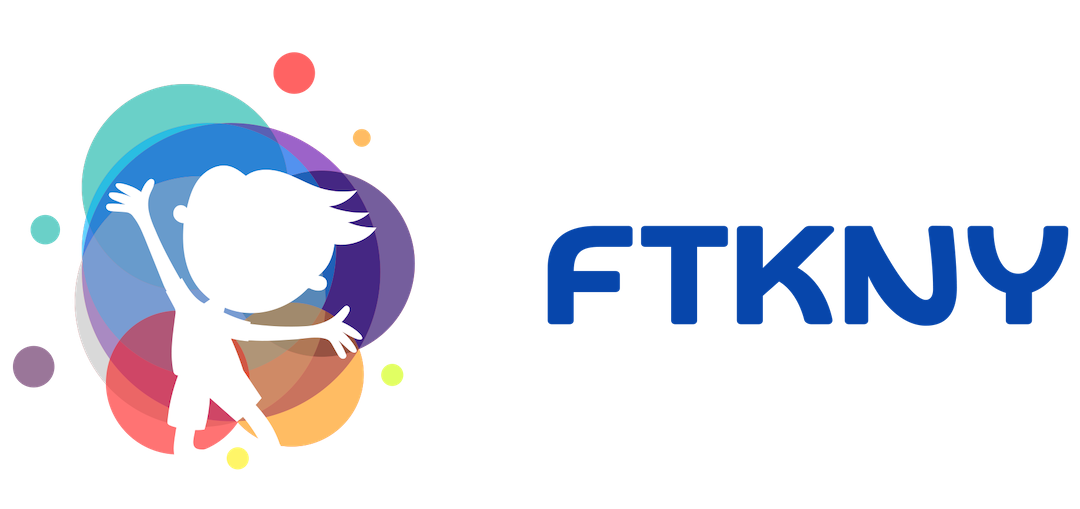Come Join The Staten Island FasTracKids Chess Club 2024!
Chess Club participants will sharpen their tactical skills through puzzles and learn tips & tricks throughout the classes.
Beginner students will learn the basics and quickly be equipped to play a chess game. Beginner and intermediate students alike will advance through lectures, puzzles, and quizzes.

Chess Lesson Benefits:
- Sharpens critical thinking
- Instills confidence
- Develop patience
- Think first, act second
Brand New For 2024:
- Tournaments
- Progress Reporting & Insights
- Take Home Puzzles
- & more!

Class Locations:
Grasmere – 141 Evergreen Avenue, Staten Island NY, 10305
Saturdays 9AM – 2PM
Willowbrook – 1409 Richmond Ave.
Staten Island, NY 10314
Wednesdays 3PM – 7PM
Charleston
Fridays 3PM – 7PM
Program Tuition Rates
$50.00 Registration Fee – Includes “Reach for the Stars” Prize System
Group Lessons: $160 per Month – 4 Lessons Each Month (1 Hour Each Lesson)
Private 1-1 Lessons: $300 per Month – 4 Lessons Each Month (1 Hour Each Lesson)
Take-Home Chess Puzzles: Comes With Customizable Binder (Weekly Printouts)
5 puzzles: $50 per month | 10 puzzles: $75 per month | 20 puzzles: $125 per month
Progress Reports: $50 per month – Monthly Performance Analysis Metrics and Insights
Chess Account Sign-Up: $50 per month – Includes Chess.com Account Management
Chess Tournaments: $50 per month – Trophies and Medals Awarded To 1st, 2nd and 3rd
FasTracKids Chess Tournament FAQ
Is my child ready for a tournament?
Probably! Our tournaments are really beginner friendly, and participating in these tournaments provides an excellent opportunity to gradually introduce your child to the atmosphere of a formally rated chess competition. Anyone comfortable with the rules and has gotten a checkmate or two (on purpose) during a game in chess club is ready.
How does the chess tournament work?
Chess tournaments are non-elimination, so all players will play all rounds regardless of their results. They are divided into groups called “Sections” based on grade and skill level and play onl against other children in their section. Each game a player wins is worth one point, and a draw (tie is worth half a point. Chess tournaments are typically 3-5 rounds. Participants will play opponents with scores similar to theirs. For example, if a player has won their first 3 games, they will be paired during round 4 against another player who has done the same thing (or as close as possible).
The top players in each section (determined by the number of points accrued through the tournament) and the top students win trophies. When there are ties, we use a 4-level tiebreak system. The day before each tournament we send out an email to the registrants with information and details on that specific tournament.
What's a rating and how do you get one?
After you play in your first tournament, you get a rating. When you win it goes up, when you lose it goes down, and when you draw it depends on who you played. If you beat a stronger player you go up a lot, if you lose to a stronger player, you go down a little, and the reverse is true for weaker players.
For what the numbers mean, 100 is the lowest rating, and it’s a beginner who’s lost all their games against other beginners. 700 is an intermediate player, and there’s a good chance that they’re the best player in their school. 1200 puts you in the top third of tournament players. 2000 is top 3% of tournament players, 2200 is master and is top 1% of tournament players, and 2800+ is a world champion. After each tournament, the students scores will be processed and be given updated elos based on their performance of their past tournament.
How long is a tournament?
FasTracKids Chess Tournaments range from 1.5-2.5 hours, but you should check the specific listing for that particular tournament. The trophy ceremony generally concludes 15 minutes after the last game finishes so if a listing says 1pm – 3pm, you can expect the announcements to start at 1pm, the last game to end at 3pm, and the trophy ceremony to conclude at 3:15pm. Tournaments sometimes end early, but they almost never end late.
Wait, is my child going to be playing chess for TWO HOURS? That seems like too long...
They’ll be fine! There’s twenty-five minutes allotted for each game, and since most games take less than the full half-hour, the kids return to the space where the parents are waiting (called the “skittles room” in chess talk) until the next game starts.
Do I need to stay the whole time, or can I drop my child off?
We supervise participants while they are inside the playing hall and actively playing a tournament game. The child’s parent or guardian is responsible for supervising him/her at all other times, including prior to the first round, after the last round, in between games, etc.
How are tournament games different from regular chess games?
The biggest difference is the touch-move rule!
If you touch a piece, you have to move it, if you touch your opponent’s piece you have to take it.
When you grab your piece and click it against your opponent’s piece, you have to take the piece you clicked on the board with the piece in your hand, and if you move a piece to a new square and then let go that is the end of your turn.
When your pieces are crooked, you can say ‘adjust’ and then re-center the crooked piece. If you want to be fancy you can say “j’adoube” which is “I adjust” in French. You have to say the word prior to handling the piece!
Additionally, at chess tournaments, hand-raising and self-advocacy are both strongly encouraged.
When your child is playing their game and anything unusual comes up, they should raise their hand for help.
A second difference is that the games need to be totally quiet.
Can I watch my child's games?
You can’t – before each round starts, we ask parents to leave the tournament room, and head back
to the skittles room. This helps keep the tournament hall quiet, so that participants can focus on their games.
Does my child need to write down their moves?
This is called taking notation. We don’t require it at our tournaments, though it is encouraged for players who’ve done a few tournaments, and we supply scoresheets and pencils.
What's this USCF membership thing?
The US Chess Federation (USCF) has a rating system used to rank chess players throughout the
country. It helps ensure that players get fair games and can be placed in the correct sections. In
general, if a player wins, their rating goes up, and if they lose it goes down. Ratings range from 100
(brand new tournament player) to the 2800s. Memberships can be arranged to give your child an
official USCF Elo Rating. If you’re interested in more detail about ratings, speak with Vinny.
